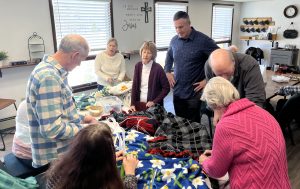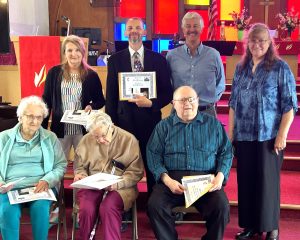On a Sunday morning after worship 25 church leaders are gathering around tables to set goals and action steps that will lead to a successful pastoral transition. At a weekday church council meeting leaders are meeting to move beyond the regular business of the council to a time of open dialogue on how best to be an open and welcoming congregation.
On a Saturday morning a circuit of churches are gathered on Zoom to name their church’s purpose and mission in the next season of ministry and to plan some action steps.
Three different churches in different contexts, all working through the same process. This is Pathways to Congregational Fruitfulness & Health. The right path and the right process can lead to productive outcomes.
Pathways offers congregations an intentional process to create a plan that provides clarity and focus that can help them take their next faithful steps in ministry and mobilize leaders and disciples to foster world-changing discipleship and ministry.
Pathways is a congregational process offered to you by Eastern PA and Greater NJ, where your team will recall your congregation’s history, reflect on the status of the church and community, and then set SMART** goals to emerge into your vision for the future.
Overall, over 120 churches across both conferences are engaged in Pathways.
Pathways builds on your congregation’s work
The leaders of EPA and GNJ know that over the years you and your congregation have done a lot of good work and have engaged in some really good resources to attain your goals. Pathways builds on the work your congregation has already done and encourages you to take on the next steps in being connected and engaged in mission and ministry.
 “At its primary level, Pathways provides vital human connection in an era of increasing isolation. On a deeper level, it offers a path to missional clarity and collective enthusiasm.
“At its primary level, Pathways provides vital human connection in an era of increasing isolation. On a deeper level, it offers a path to missional clarity and collective enthusiasm.
Since its launch in EPA, Pathways has touched more than 70 churches with a guided resource that is voluntary and free, according to the Rev. Steven Morton, former EPA Leadership Development Manager. Conversations among church leaders, led by trained facilitators and inspired by the Holy Spirit, yield new direction and purpose for Christian disciples in today’s environment.
“Turning words into action sets us on the path to success,” says the Rev. Innica Humphery, pastor of First UM Church of Englewood, NJ. She emphasizes the profound impact of aligning actions with beliefs, while finding strength in Christ, as we draw inspiration from Philippians 4:13. Through their Pathways engagement, her church has fostered deeper, more purposeful relationships with their neighbors, such as collaborating with the police department to establish a youth basketball league.
As lay leader of Succsaunna UM Church, Linda Diffley emphasizes the holistic nature of the Pathways approach, urging her congregation to expand their perspective beyond the confines of traditional church practices. A Pathways team leader, Linda Diffley saw the opportunity to reimagine the church’s role in people’s lives beyond just Sundays. It’s about fostering a culture of support and empowerment that extends beyond the church walls and into the broader community, driven by a commitment to growth and positive change.
The need to adapt to a post-pandemic world
Succsaunna’s pastor, the Rev. Stephen Yun, echoes this sentiment as he reflects on his church’s journey through Pathways process. Recognizing the need to adapt to a post-pandemic world, his congregation embarked on a collective exploration of what it means to embody the principles of their faith in tangible ways.
Through intentional goal setting and action planning, they sought to engage with their community and nurture the next generation of leaders. “The Discipleship Path Team identified 15-20 promising new leaders aged 25-45,” he said. “The team continues to work on establishing a clear, intentional roadmap to equip them as transformative leaders and creating opportunities for their leadership development and spiritual formation through mentoring, discipleship classes and life groups (small groups).”
Pathways offered Clinton UMC a framework to guide their discussions particularly around cultural competency. That work helped to “highlight some of the places where greater transparency was needed about the scope of our ministry,” said the Rev. Jessica Brendler, pastor. While committee leaders or admin council members knew about yearlong stewardship emphases or overall goals around small group ministry, she shared, those elements were not “seen” by the church folk who weren’t involved in the planning process.”

An activity at West Willow UMC (PA)
West Willow UMC, guided by the Rev. Helen Adams. A Pathways facilitator, went through the program and saw a boost in volunteerism and group engagement with new ministry initiatives. “As soon as the new ideas were implemented,” said Pastor Bob Garvey, who endorsed the program, “we saw a significant increase in church volunteers and small groups. I highly recommend the Pathways Program to any church which is looking to grow.”
Enhancing vitality, engagement, sustainability
Many churches view Pathways primarily as a tool for enhancing congregational vitality. Yet its scope extends far beyond that singular focus. In July, the Rev. Lorelei Toombs, Associate Superintendent of EPA’s North-West Region, will begin working on Pathways Community Engagement to support churches interested in being more engaged in their community. That interest may lead churches and partner organizations to become Wholeness and Hope Centers.
In addition, a team of leaders is being trained to support congregations in Journey of Hope efforts, most specifically by writing JOH plans. Also, cohorts will be offered for churches who want to deepen their youth ministry efforts with the support of Next Gen Ministries. Meanwhile, other churches are using Pathways as a platform to do the challenging work of considering their sustainability or navigating church conflicts to peaceful, hopeful resolution.

Five new members of Emmanuel UMC pose with Pastor Lela Hartranft (right) and the Rev. Steve Morton (right, rear)
Emmanuel UMC in Allentown witnessed firsthand the impact of Pathways Sustainability sessions led by Morton. The leadership was inspired to take action to elevate their sustainability level. “We formed a praise team, involved more congregants in scripture readings, and prioritized welcoming visitors,” said Lela Hartraft, a Certified Lay Minister. “Recognizing the importance of stewardship, we integrated moments into our services to honor offerings and talents, and we initiated small group meetings.”
While they have made significant strides, they are aware that the journey towards sustainability is ongoing. “In the coming weeks, we anticipate welcoming six new members, a testament to the vitality and growth of our community. We still have a long way to go and will continue to strive to improve with God’s help.”
If you want to learn more about how Pathways might help your church experience growth and vitality, reach out to explore the possibilities with us. In EPA, check out https://www.epaumc.org/pathways/. In GNJ visit https://www.gnjumc.org/pathways/. We invite you to request a consultation.
*The Rev. Gina Yeske is a GNJ Associate Superintendent (Metro-Highlands Region), who helps manage the EPA&GNJ Pathways initiative.
**SMART goals are Specific, Measurable, Achievable, Relevant and Time-Bound

